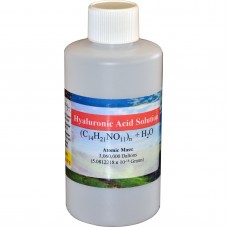Hyaluronic Acid (also called Hyaluronan and Hyaluronate) is a non-sulfated glycosaminoglycan distributed widely throughout connective, epithelial, and neural tissues. It is one of the chief components of the extracellular matrix. The average 70-kg man has roughly 15 grams of Hyaluronic Acid in his body, one-third of which is turned over (degraded and synthesised) every day.
Until the late 1970s, Hyaluronic Acid was described as a "goo" molecule, a ubiquitous carbohydrate polymer that is part of the extracellular matrix. For example, Hyaluronic Acid is a major component of the synovial fluid and was found to increase the viscosity of the fluid. Along with lubricin, it is one of the fluid's main lubricating components.
Hyaluronic Acid is an important component of articular cartilage, where it is present as a coat around each cell (chondrocyte). When aggrecan monomers bind to Hyaluronic Acid in the presence of link protein, large highly negatively-charged aggregates form. These aggregates imbibe water and are responsible for the resilience of cartilage (its resistance to compression). The molecular weight (size) of Hyaluronic Acid in cartilage decreases with age, but the amount increases.
Click here to read more about Hyaluronic Acid.
250ml Hyaluronic Acid Serum
- Product Code: HAS250
- Availability: In Stock
-
$50.00

